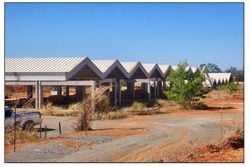The question is, did the returns justify the outlay. There is no evidence that last year’s efforts produced anything substantial, while the President’s report on this year’s certainly did not suggest that major investments would start flowing any time soon, or that huge joint projects were in the offing. There was agreement about a feasibility study to be undertaken by Guyana and the subsequent submission of a project proposal for an infrastructure project worth up to US$10M. This was in Kuwait, and it all seemed a little nebulous. In Iran, an MOU was signed for a US1.5M grant for the health sector – a fairly modest sum considering the head of state took the trouble of going to Tehran in person.
Mr Jagdeo did say, however, that Iran had offered to map this country’s mineral wealth, and that a mission would be here soon to work with the Geology and Mines Commission. It does not sound as if mineral mapping was on the President’s original shopping list, so one presumes that the Iranians suggested it. In any event, they seem so enthusiastic about this project and so determined to act with expedition, that one must conclude they see advantages in it for themselves, and not just for Guyana. Exactly what these might be is a matter for speculation, but one might have hoped that a country which was so close to Caracas would not have been the one to have the benefit of information on the full extent of this nation’s mineral potential.
But the question is, why are we courting Middle Eastern countries with such assiduity, when our links with the area both historical and economic are so tenuous? Just what are we hoping to gain?
The answer which the head of state has consistently given is investment. But one wonders if this is realistic; after all, what is to tempt Arab and Mediterranean countries, etc, here when it is a kind of economic cul-de-sac? It is true that we seem to be moving towards becoming a transit zone for north-eastern Brazil, a potentially huge market in which some Middle Eastern countries might have an interest; however, an arterial connection has not been established as yet, and in any case, as things stand there is nothing preventing distant nations from making direct investments in Brazil, bypassing us altogether.
GINA has also quoted the President as talking about strengthening ties with non-traditional trading partners. But just what is a minuscule economy like this going to trade with a country like Kuwait, for example? The various economic agreements which have been signed over the decades with our neighbours have never been fully implemented, so what kind of vibrant trading relationship could be imminent with “non-traditional trading partners”?
Iran, of course, has different interests on this continent, but these are primarily political. However, in that game we are neither here nor there because we are too insignificant. Iran is part of the Venezuelan axis which includes Bolivia, Ecuador and Nicaragua. Honduras has now fallen away from the grouping, and while Brazil was never in it, President Lula did receive President Ahmadinejad on an official visit recently. However, since according to current polls there seems every likelihood that in this year’s general election the centre right candidate, José Serra, might win, Tehran might soon find itself unwelcome in Brasilia.
What President Jagdeo does seem to be doing is going out of his way to publicly distance this country from the United States. However, his reported comments do not clarify exactly in what way the relationship with the US is to change. He was quoted by GINA as saying, “Many of the moves of the Americans around the globe are against the norms and merely ensure their own interests.” Well that goes for all countries, including China and Iran, both of which he is now touting with enthusiasm. In fact, in places like Dafur, China is pursuing its own economic interests at great human cost, while it is the US which has adopted the more principled position.
The head of state here was also quoted as saying, “Although we live in the vicinity of the United States, we are not agreed with their entire stands…” It is unlikely that any country would agree with ‘the entire stand’ of a large nation, so why is the US being singled out?
China and Iran are not democracies; in fact, the circumstances of Iran’s last election were questionable, and the repression which followed the protests one would have thought would have made the PPP uneasy, especially given their history. But no, they have brushed the issue aside, saying it was an internal matter. It might be observed that the ruling party did not regard it as a purely internal matter when the PNC rigged elections, and that it was the democratic US which facilitated the return of free and fair elections, not the undemocratic China.
Possibly more significant might be President Jagdeo’s reported comment: “There are many countries and nations in the world today that do not seek solutions through attachment to the US, having chosen other paths.” Well, what other paths is he talking about? In this hemisphere as mentioned above, there is a divide between the more traditionally democratic nations, not all of which are closely associated with the US (Brazil, in particular, is a power in its own right), and President Chávez’s anti-American association. Are we to infer that with the excursion to Iran and the statements about the United States, that we are moving into the shadow of the Alba grouping? Just what exactly is going on?
The dangers for this country of moving into Miraflores’ orbit will not be elaborated on here, although they should be fairly obvious. Where Iran specifically is concerned, however, the Office of the President should be aware that Tehran is a state sponsor of terrorism, including on this continent. In 2006, Argentine prosecutors formally accused Iran of directing the 1994 bombing of a Jewish centre in Buenos Aires which killed 85 people and injured 300, and Hizbollah of carrying out the attack. Needless to say, President Ahmadinejad was not welcome in Buenos Aires at the end of last year, even although President Kirchner is close to Mr Chávez. Do we agree with Iran’s ‘stand’ on terrorism, or is that too an internal matter?
There is also the issue of Iran’s nuclear ambitions, and one cannot think why, at a time when there is a move to impose further international sanctions on Tehran which even Russia might be disposed to entertain in some form or another, this country should be so anxious to identify itself with Iran. Do we agree with their ‘stand’ on the nuclear issue as well? If we have no views or do not wish to express an opinion, we should not be acting in a way which opens us to misinterpretation.
At the bottom of all of this personal diplomacy being pursued by President Jagdeo lies an unanswered question: Exactly what is the foreign policy of this nation? It has not been elucidated in Parliament in a coherent way, and the public is left to deduce or infer what it can from reported statements supplied by GINA or the Iranian news agency, or else incidental remarks from the head of state himself at press conferences. The problem is, sound-bites do not add up to a foreign policy.



